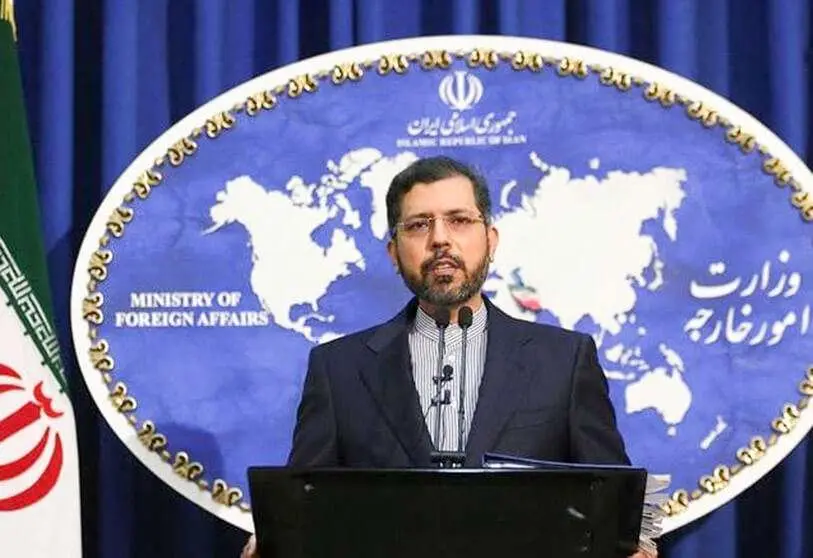Iran responds to French and German condemnation of the seizure of two Greek oil tankers

Iranian Foreign Ministry spokesman Saeed Khatibzadeh on Wednesday attacked France and Germany for their condemnation of Tehran's seizure of two Greek oil tankers. "We strongly reject these biased and unjustified statements that have apparently become an ingrained habit of those issuing them," Jatibzadeh said, referring to two communiqués issued by the Berlin and Paris chancelleries.
"We recommend these countries to support judicial processes that are based on international rules and regulations aimed at ensuring freedom of navigation and maritime safety instead of evading and giving useless support to the violations committed by Greek vessels," Jatibzadeh continued.
Iranian Commandos Seize Greek Oil Tanker in the Persian Gulf #Iran #Greece #IRGC #JCPOA #terrorism #Pirates pic.twitter.com/RiTuloJAdE
— MEMRI (@MEMRIReports) June 2, 2022
Last Friday, the Islamic Revolutionary Guard Corps (IRGC), an elite corps under the command of Iran's supreme leader, seized two Greek oil tankers in the Gulf, accusing them of "committing violations" in the country's waters. Athens responded by calling the IRGC operation an act of "piracy" and warned its citizens against travelling to Iran.
Tehran's actions came days after the Hellenic country had done the same to a Russian oil tanker that was carrying Iranian oil, as part of Brussels' sanctions on Russia following its invasion of Ukraine.

Several reports indicated that Greece then began the process of transferring the seized Iranian oil to the US, which has repeatedly seized Iranian oil shipments and sold them on as part of its sanctions regime.
Paris and Berlin strongly condemned Iran's actions against its Greek ally. The Quai d'Orsay said the seizure of the tankers constituted a "grave violation of international law" and called on Iran to "immediately release the crews and ships". The German Foreign Ministry, for its part, called Tehran's actions an "unjustifiable interference in commercial shipping" and therefore "a serious violation of international norms".

The Iranian spokesman responded by deploring Franco-German opposition to the Persian country's 'legal moves', accusing them of double standards by 'keeping silent about the illegal seizure of an Iranian-flagged ship by the Greek authorities and the unloading of its cargo to enforce the extraterritorial rules and internal decisions of a third country [the US]'.
"As we have told Greek officials, it is appropriate that proper action be taken through legal and judicial channels with the relevant Iranian authorities to resolve disputes rather than making political and media moves," Khatibzadeh warned.

Iran's oil sector has been under US sanctions since 2018, when the Trump administration abandoned the Joint Comprehensive Plan of Action (JCPOA). The latter, better known as the "Iran nuclear deal", is an international treaty signed by Iran, the US, the UK, France, Germany, the EU, Russia and China that regulates Iran's nuclear programme to ensure its use for civilian purposes in exchange for the removal of international sanctions. However, Trump abandoned the agreement and reinstated the sanctions regime, demanding a number of domestic and foreign policy concessions from the Islamic Republic.
Since then, Tehran has responded by repeatedly seizing foreign oil tankers and ships, among other actions. Already in 2019, Iran detained a British tanker after the UK had done the same with an Iranian tanker in Gibraltar. Also in 2021, a South Korean cargo ship met the same fate, following Seoul's refusal to unfreeze some $7 billion of Iranian assets sanctioned by Washington. And now it seems that Tehran may be using the same tactic again.

"Unfortunately, the Greek government has shown that taking orders from a third party is more important to them. But we believe that relations between Iran and Greece should remain well-intentioned," said Khatibzadeh in an earlier statement, referring to Washington's alleged pressure on Athens. "I suggest to the Greek government to take the legal and judicial route," the Iranian spokesman added.
Meanwhile, according to Amwaj.media, Iran's state-run Al-Alam TV threatened Greece with further captures of its vessels if it did not understand the IRGC's "message", adding that there were up to 17 Greek ships in the Gulf at the time. Kayhan, a newspaper close to the supreme leader, warned that the IRGC would do the same to "any country under US command".
This new episode comes at a time when negotiations in Vienna between JCPOA signatories to return to Washington's agreement have stalled in the face of the White House's refusal to remove the IRGC from the State Department's list of Foreign Terrorist Organisations, one of Tehran's main demands.
Americas Coordinator: José Antonio Sierra








